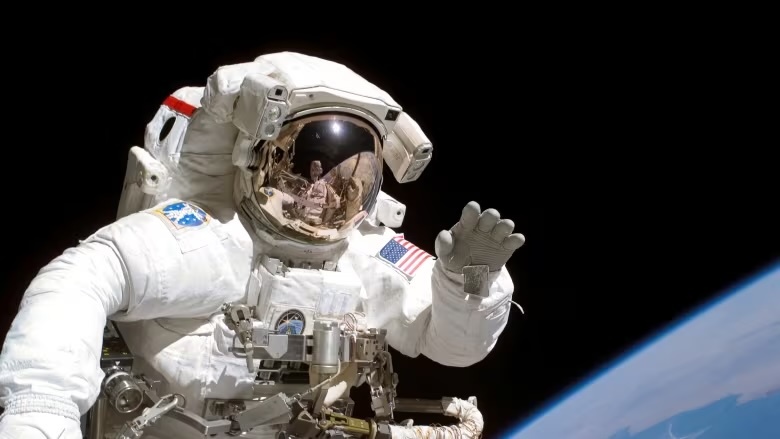24.11.2024
Biggest study to date analyzes the impact of space travel on astronaut cognition

American astronaut Joseph Tanner waves to the camera during a space walk. Many astronauts report feeling a sort of brain fog when they are up in space, and a new study shows that while they do perform some tasks slower in space, there are no signs of permanent cognitive decline. (NASA
A new study shows that astronauts who experience slower mental performance in space — what Canadian astronaut Robert Thirsk jokingly called the "space stupids" — resume normal function after returning to Earth.
The study from NASA's Behavioural Health and Performance Laboratory at the Johnson Space Centre aims to help scientists understand more about these cognitive changes, and is the biggest of its kind to date.
Researchers, led by Dr. Sheena Dev, analyzed 25 astronauts who spent an average of six months in space during space expeditions that took place from 2018 to 2022. These space explorers were told to perform a series of 10 different performance tasks on several occasions before, during and up to 30 days after their spaceflight.
While astronauts floating freely in the International Space Station get to enjoy the experience of weightless life, the space environment is hard on the body and the mind.
Without the influence of gravity, fluids shift to the upper body causing puffiness in the face, muscle loss resulting in what's described as "bird legs", calcium loss in bones and sometimes vision problems due to extra pressure on the eyes.
In addition, astronauts who live in space for months at a time often report feeling a form of brain fog, having slower reaction times and making more mistakes than they would on Earth.
There has been concern that during even longer missions to the moon and Mars, this effect could become stronger, possibly endangering the crew when critical decisions need to be made.

The causes of this cognitive decline are not well understood, in part because astronauts are high-performing people and many standardized cognitive tests aren't sensitive enough to measure their differences in performance. The changes could be due to the effect of weightlessness on the brain, isolation, or higher radiation levels in space.
Or, it could also be that astronauts are often sleep deprived, overworked, and in a high-stress situation where mistakes can have serious consequences, which can also lead to cognitive issueseven for those of us here on Earth.
The study found that, overall, the astronauts' reaction times were slower on tasks requiring speed, memory and attention. The changes took place at different times in the mission.
Their attention span was slower in the beginning of the mission, and their working memory was slower at the end of the mission. After an initial drop post-launch, their ability to recognize facial emotions on others got better throughout the expedition, as did their problem-solving skills and pattern recognition.
It's important to note that even though their performance had slowed, the astronauts still accomplished all tasks with precision, and their performance came back to normal and there was no sign of permanent brain damage after they returned to Earth.
That's good news for people living on the International Space Station where flights are seldom more than six months.

A trip to Mars, on the other hand, will require seven to nine months of travel, depending on trajectory. Once they arrive on the red planet, the crew will have to remain there for up to a year until the planets align for an opportunity to return home, which would take another nine months. That's a 21-month trip just to go to Mars and back.
No one has lived in space that long. The question is whether cognitive decline will worsen on longer journeys. And while there is gravity on Mars, it is only about one-third that of Earth, so we don't know if performance will recover there as it does on Earth.
This is just the latest in a long list of psychological factors that need to be taken into consideration if humans are to become a multi-planet species.
The technological challenges are being met with new rocket technology, such as the SpaceX Starship and NASA's Space Launch System. But how people will get along with each other when they're spending long periods in a confined space, dealing with isolation from Earth, navigating the hazards of spaceflight, all while dealing with the desolate environment on Mars, has yet to be tested.
Hopefully, the first Martian explorers will be able to think and act quickly to avoid making space stupid-induced mistakes.
Quelle: CBC
